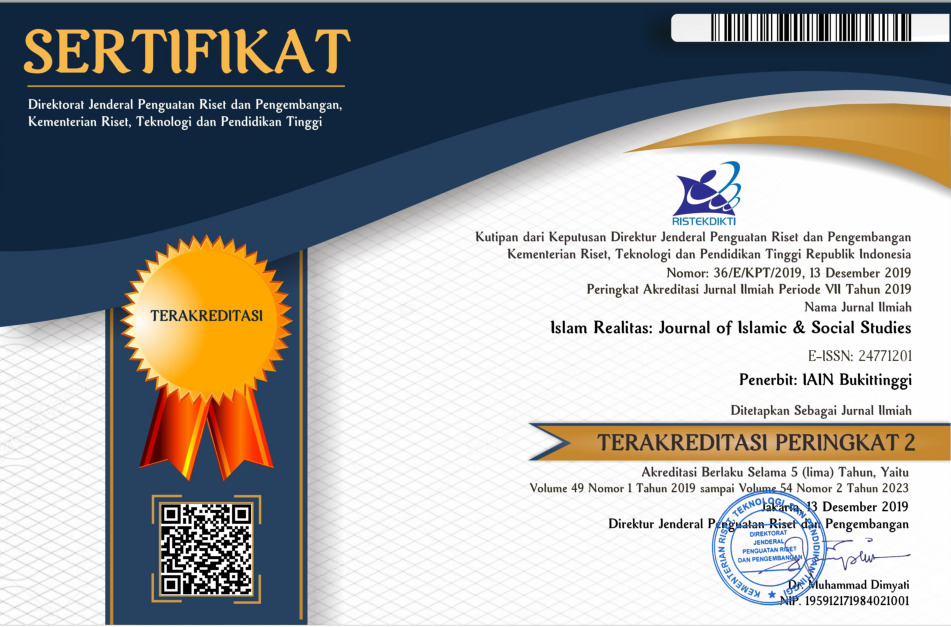The Islamic Fundamentalism Based on Karen Armstrong's Perspective and Its Implications for The Identification of Fundamentalism Groups in Indonesia
Downloads
One of the developments at the end of the twentieth century was the emergence of a militant piety popularly called "fundamentalism" in each religious tradition. This term was also used to indicate a new movement in the Islamic revival. Karen Armstrong stated three characteristics of the fundamentalism movement, including Islamic fundamentalism. First, the movements of ideology and theology came of the fear. Second, these movements were not old things, but they were modern, innovative and modernizing movements. Third, the fundamentalism groups had a textual understanding of religion. Armstrong's perspective on Islamic fundamentalism had implications for the Islamic Defenders Front (FPI) and the Indonesian Mujahidin Council (MMI) which could be identified as Islamic fundamentalism groups in Indonesia. The mainspring of the emergence of FPI and MMI was as the response (read: fear) to foreign forces that threatened and made Muslims suffered for a long time. The forms of movements and actions of FPI and MMI were so organized and used the spirit of the masses to respond to actual problems in the community that were sometimes missed by the authorities. As well as the interpretation of the concept of amar ma'ruf nahi munkar was promoted by FPI and the affirmation of MMI related to the prohibition on the use of logical reasoning in text interpretation. Those facts made these two groups legitimate as fundamentalism groups within the framework of Karen Armstong's analysis.
 Salah satu perkembangan pada akhir abad kedua puluh adalah munculnya di setiap tradisi agama sebuah kesalehan militan yang secara populer disebut “fundamentalismeâ€. Istilah ini juga dipakai untuk menunjukkan sebuah gerakan baru dalam kebangkitan Islam. Karen Armstrong membuat tiga karakteristik gerakan fundamentalisme, termasuk di dalamnya fundamentalisme Islam. Pertama, ideologi dan teologi gerakan ini berakar dari ketakutan. Kedua, gerakan-gerakan ini bukanlah sebuah hal kuno yang datang dari masa lampau, mereka adalah gerakan modern, inovatif dan memodernkan. Ketiga, kelompok fundamentalisme memiliki pemahaman agama secara tekstual. Perspektif Armstrong tentang fundamentalisme Islam ini berimplikasi pada Front Pembela Islam (FPI) dan Majelis Mujahidin Indonesia (MMI) yang dapat diidentifikasi sebagai kelompok fundamentalisme Islam di Indonesia. Raison d’etre FPI dan MMI yang hadir sebagai respon (baca: ketakutan) atas kekuatan-kekuatan asing yang mengancam dan membuat umat Islam mengalami penderitaan panjang; bentuk pergerakan dan aksi FPI dan MMI yang begitu terorganisir dan menggunakan semangat massa untuk merespon permasalahan-permasalahan aktual di masyarakat yang terkadang luput oleh aparat; serta penafsiran konsep amar ma’ruf nahi munkar yang diusung oleh FPI dan penegasan MMI terkait larangan penggunaan nalar dalam interpretasi teks, membuat kedua kelompok ini sah sebagai kelompok fundamentalisme dalam kerangka analisis Karen Armstong.
Books
Armstrong, Karen, Berperang Demi Tuhan: Fundamentalisme dalam Islam, Kristen dan Yahudi, terj. Sahio Wahono, dkk, (Jakarta: Mizan & Serambi Ilmu Semesta, 2013)
Armstrong, Karen, Masa Depan Tuhan: Sanggahan terhadap Fundamentalisme dan Ateisme, terj. Yuliani Liputo (Bandung: Mizan, 2013)
Bruce, Steve, Fundamentalisme Pertauatan Sikap Keberagamaan dan Modernitas (Jakarta: Erlangga, 2000)
Choueiri, Youssef M., Islam Garis Keras: Melacar Akar Gerakan Fundamentalisme, terj. Humaidi Syuhud dan M. Maufur, (Yogyakarta: Qonun, 2003)
Departemen Pendidikan dan Kebudayaan RI, Kamus Besar Bahasa Indonesia (Jakarta : Balai Pustaka, 1991)
Echols, Jonh M. dan Hassan Shadily, Kamus Bahasa Inggris-Indonesia (Jakarta: PT Gramedia,1979)
Engineer, Asghar Ali, Islam dan Teologi Pembebasan, terj. Agung Prihantoro (Yogyakarta: Pustaka Pelajar, 1995)
Imarah, Muhammad, Fundamentalisme dalam Perspektif Pemikiran Barat dan Islam (Jakarta: Gema Insani Press, 1999)
Kimball, Charles, Kala Agama Jadi Bencana, terj. Nurhadi (Bandung: Mizan, 2003)
Mahendra, Yusril Ihza, Modernisme dan Fundamentalisme dalam Politik Islam (Jakarta: Paramadina, 1999)
Rosidin, Relasi Sosial Majelis Mujahidin dalam Konstelasi Kebangsaan (Semarang: Balai Penelitian dan Pengembangan Agama, 2002)
Sahrasad, Herdi dan Al Chaidar, Fundamentalisme, Terorisme dan Radikalisme Perspektif atas Agama, Masyarakat dan Negara,(Jakarta: Freedom Foundation & CSS UI, 2017)
Shidqi, Ahmad, Sepotong Kebenaran Milik Alifa (Yogyakarta: Impulse, 2008)
Journals
Ali, Nor Huda, ‘Gerakan Fundamentalisme Islam di Indonesia’, Tamaddun, 14. 2 (2015), 123-124
Anwar, Saeful, ‘Pemikiran dan Gerakan Amr Ma’ruf Nahy Munkar Front Pembela Islam (FPI) di Indonesia 1989-2012’, Teosofi, 4.1 (2014), 246
Basyir, Kunawir, ’Menimbang Kembali Konsep Gerakan Fundamentalisme Islam di Indonesia’, At-Tahrir, 14. 1 (2014), 33
Chaq, Moh. Dliya’ul, ‘Pemikiran Hukum Gerakan Islam Radikal: Studi Atas Pemikiran Hukum dan Potensi Konflik Sosial Keagamaan Majelis Mujahidin Indonesia (MMI) dan Jama’ah Anshorut Tauhid (JAT)’, Tafaqquh, 1.1 (2013), 23-24
Dzawafi, Agus Ali, ‘Pemahaman Tekstual dan Implikasinya Terhadap Gerakan Dakwah Front Pembela Islam (FPI)’, Adzikra, 3.1 (2012), 30
Fauzan, ‘Fundamentalisme dalam Islam’, Al-Adyan, 5. 1, (2010), 47
Fuadi, Maimun, ‘Fundamentalisme dan Inklusifisme dalam Paradigma Perubahan Keagamaan’, Jurnal Substantia, 15. 1 (2013), 115
Idrus, Muhammad, ‘Fundamentalisme sebagai Ideologi Transisi’, Unisia, 25.4 (2002).
Sadik, M., ‘Al-Qur’an Dalam Pendekatan Pemahaman Tekstual dan Kontekstual’, Hunafa, 6. 1 (2009), 55
Santi Selvia, ‘Terorisme Dan Agama Dalam Perspektif Charles Kimball’, Jurnal ICMES, 1. 2 (2017), 188
Syaefudin, Machfud, ’Reinterpretasi Gerakan Dakwah Front Pembela Islam (FPI)’, Jurnal Ilmu Dakwah, 34. 2 (2010), 261.
Syamsi, Badarus, ‘Konflik dan Kontestasi Fundamentalisme dan Liberalisme para Pembela Tuhan’, Refleksi, 13.1 (2011), 100.
Syamsurijal, ‘Kekerasan Berbingkai Agama: Menelusuri Genealogi dan Perkembangan Fundamentalisme dalam Dunia Islam’, Al-Fikr, 20. 1 (2016), 34
Wijdan SZ, Aden, ‘Fundamentalisme Islam: Kecendrungan antara Menafsirkan Realitas dan Doktrin’, UNISIA, 25. 5 (2002), 23
Authors who publish with this journal agree to the following terms:
- Authors retain copyright and grant the journal right of first publication with the work simultaneously licensed under a Creative Commons Attribution License that allows others to share the work with an acknowledgment of the work's authorship and initial publication in this journal.
- Authors are able to enter into separate, additional contractual arrangements for the non-exclusive distribution of the journal's published version of the work (e.g., post it to an institutional repository or publish it in a book), with an acknowledgment of its initial publication in this journal.
- Authors are permitted and encouraged to post their work online (e.g., in institutional repositories or on their website) prior to and during the submission process, as it can lead to productive exchanges, as well as earlier and greater citation of published work (See The Effect of Open Access).









